Summary 
An expertly directed production - clearly told, colorfully designed, seamlessly quick-paced - with an early-20th century setting and a Freudian perspective. A standout Puck, mischievous and shaved-headed and of ambiguous sexuality, among a slew of consistently good performances in a pleasantly breezy comedy.
Design
Directed by Gary Griffin. Costume design by Mara Blumenfeld. Scenic design by Daniel Ostling. Lighting design by Philip S. Rosenberg. Sound Design by Rob Milburn and Michael Bodeen.
Cast
Timothy Edward Kane (Theseus/Oberon), Tracy Michelle Arnold (Hippolyta/Titania), Kurt Ehrmann (Egeus), Andy Truschinski (Lysander), Matt Schwader (Demetrius), Christina Nieves (Hermia), Laura Huizenga (Helena), Tim Kazurinsky (Peter Quince), Ron Orbach (Nick Bottom), Elizabeth Ledo (Puck).
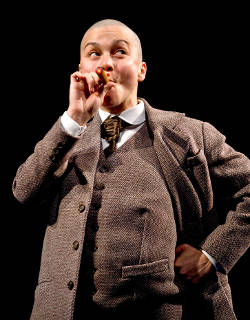
Analysis
Director Gary Griffin's lightning-paced A Midsummer Night's Dream begins with a projection of Sigmund Freud - an alarmingly close close-up across an upstage backdrop, about fifteen feet high - and with the in-character appearance of the psychoanalyst himself as a short, bald-headed, bearded and broad-shouldered gentleman in a three-piece-suit with watch fob, puffing a phallic cigar, there seems to be more than a subtle hint at a deeper insight into the play's relationships. Before the production starts, mini-Freud plays a record on a little victrola - the usual admonitions against leaving seats and cellophane-wrapped treats - and blows a plume of cigar smoke straight up into the air. In 2.1, the cigar-chomping doctor disrobes to reveal himself as Puck, a beaming Elizabeth Ledo, now in bicycle shorts with a bulging codpiece and a tightly-fitted blouse. The expectation is that Shakespeare's four young lovers, unleashed from the rules and strictures of Athens and almost-literally laid bare in the enchanted woods, will undergo something more than the usual transformation, perhaps something with a psychanalytical subtext. But apart from establishing an early-twentieth-century costuming time period, the use of Freud is really just a sly wink without much exposition, and the production proceeds unencumbered.
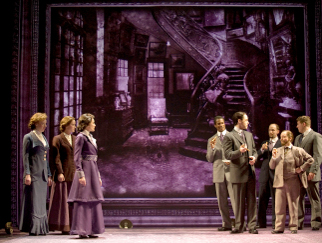
Indeed, Griffin's production unfolds very quickly and with a graceful ease, all the performances well-spoken and the cast colorfully costumed. Griffin begins on a musical note, with Bottom and the rude mechanicals singing like a barbershop quartet, punctuated with bluesy bursts from Bottom's harmonica. During 1.1 Puck briefly remains concealed by his woolen Freud suit - resembling something of a Mini-Me Daddy Warbucks - as a member of Theseus' court. The courtiers are clearly divided by gender, the women milling and speaking stage right as if early-20th-century suffragettes, the strutting men at stage left like puffed-up businessmen, wearing expensive vested suits and smoking cigars. Theseus himself is a cadaverously dry Duke with black eyeglasses, slicked-back hair, and a slow and deliciously droll delivery, and that delivery is all that remains when Griffin moves 2.1 to the forest and Timothy Edward Kane, now long-haired and bare-chested in doubling as Oberon, resembling a heavy metal rock god.
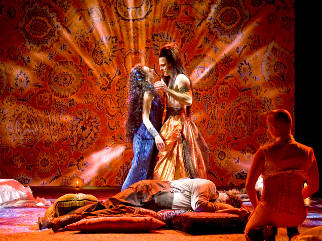
Ledo's Puck dispatches one of Titania's fairies, each of the fairies in color-coded striped pajamas, sunglasses, and a matching color headpiece that reveals something of their name, e.g. gray cotton candy Cobweb, yellow flower Mustardseed, etc. Puck then seems to raise the heavy Oriental carpet on the stage as if by magic, so it floats above the stage like a tie-dyed hippie canopy, and she grins as if gratified with her handiwork. She returns later comically out of breath - having run around the world - to Oberon's side with the dark purple love-in-idleness magical flower. Even the upstage backdrop glows with psychedelic design as they observe a lanky bookworm Helena pursue a stomping Demetrius, then cast a spell over Titania: "wake when some vile thing is near."
Griffin breezes through the comic scenes in the woods, with Ledo's Puck stealing a scene here and there - lifting Hermia's skirt, making owl calls and waddling behind Bottom in an imitation of his gait, or exclaiming with hands-on-hips amusement: "Lord, what fools these mortals be!" - and Griffin wraps the scenes around a well-placed intermission to keep the feather-light antics fresh and funny.
The actors portraying Demetrius and Lysander, veterans of American Players Theatre in Wisconsin, are a subtle pair who seem to have blundered out of a 1920s university and still pine for the old fraternity days. Demetrius bolts upright once bewitched - "Oh, Helen!" - schoolmarm Helena embracing him passionately until pausing to check whether she is being ridiculed, and Lysander is all open-mouthed preppy shock and awe. Hermia strolls far upstage, silhouetted behind the vertical curtain, calling for Lysander, while Kane's Oberon kneels and observes with Puck, the former growing in anger and the latter in amusement.
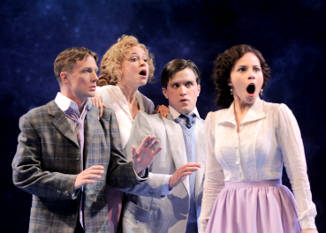
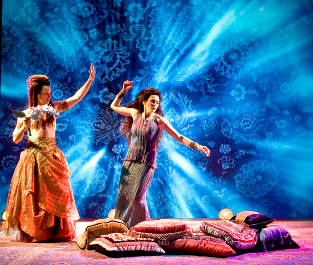
The lovers are all dressed in various shades of lavender, and the ladies appear to be wearing the identical skirt-and-blouse combination. After being admonished with a stern stroking of the crown of his bald pate by Oberon - "this is thy negligence" - Puck jumps back into action. Her playful punches at the boys are punctuated with cymbal crashes as she exacerbates all the tensions, then disarms everyone by putting them to sleep. While the lovers succumb to the spells, she moves from character to character and removes their outer clothing - sometimes struggling comically - metaphorically, like Freud, peeling away layers of consciousness. Then Bottom wakens and finds his ass's ears removed - "I had a dream" - and royalty arrives with Egeus to the sound of echoing hunters' horns.
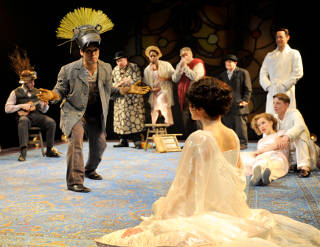
After a particularly poignant moment 4.1 from Egeus - who in a classy surrender reflects, then moves forward to give Hermia a warm embrace of forgiveness before exiting downstage - the triumphant, underwear-clad lovers gather in a sports huddle-like embrace of their own. Griffin match-cuts 4.2 to the warm embrace of the re-translated Bottom by his fellow homespuns as he returns upstage. Theseus and Hippolyta, now lounging in silken white pajamas and robes with fluffy white slippers, lead the similarly attired newlyweds back onstage 5.1 for post-banquet entertainment. Kane's droll dryness - "this is hot ice!" - juxtaposes with Quince's nervous yammering stammer, and Griffin, an accomplished director of musicals in the Chicago area, infuses the performance of "Pyramus and Thisby" with entertaining chunks of music, from Bottom's harmonica joined by ukulele, Peter's triangle, and spoons-on-a-washboard rhythm to Thisby belting out a throaty blues tune.
Griffin concludes his seamless production with the royalty and newlyweds rising in alarm ("no! no epilogue!") then an intriguing exchange - a brief glance of recognition and remembrance, even longing - between Bottom and the perhaps-knowing Hippolyta, her long Titania-hair now bound in an elegant bun. Kane's Theseus leans in to kiss his bride but she stops him and coyly removes his eyeglasses for a more passionate kiss. After he scoops her in his arms and carries her from the stage, Ledo's Puck returns again as mini-Freud with a cigar to offer the final apologies.